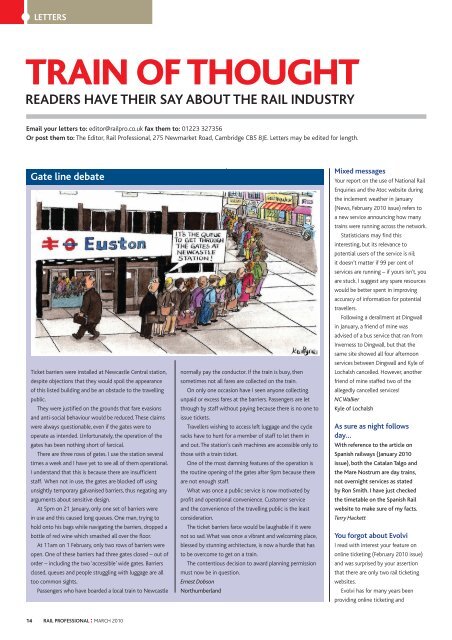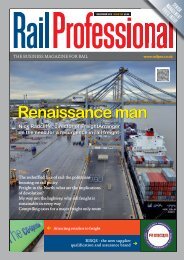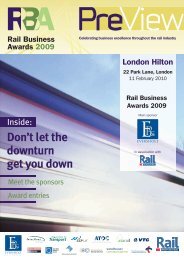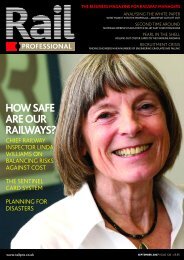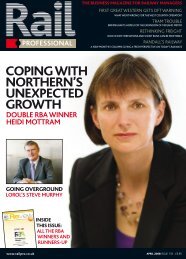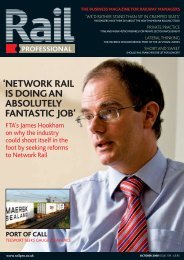View as PDF - Rail Professional
View as PDF - Rail Professional
View as PDF - Rail Professional
Create successful ePaper yourself
Turn your PDF publications into a flip-book with our unique Google optimized e-Paper software.
LETTERS<br />
TRAIN OF THOUGHT<br />
READERS HAVE THEIR SAY ABOUT THE RAIL INDUSTRY<br />
Email your letters to: editor@railpro.co.uk fax them to: 01223 327356<br />
Or post them to: The Editor, <strong>Rail</strong> <strong>Professional</strong>, 275 Newmarket Road, Cambridge CB5 8JE. Letters may be edited for length.<br />
Gate line debate<br />
Ticket barriers were installed at Newc<strong>as</strong>tle Central station,<br />
despite objections that they would spoil the appearance<br />
of this listed building and be an obstacle to the travelling<br />
public.<br />
They were justified on the grounds that fare ev<strong>as</strong>ions<br />
and anti-social behaviour would be reduced. These claims<br />
were always questionable, even if the gates were to<br />
operate <strong>as</strong> intended. Unfortunately, the operation of the<br />
gates h<strong>as</strong> been nothing short of farcical.<br />
There are three rows of gates. I use the station several<br />
times a week and I have yet to see all of them operational.<br />
I understand that this is because there are insufficient<br />
staff. When not in use, the gates are blocked off using<br />
unsightly temporary galvanised barriers, thus negating any<br />
arguments about sensitive design.<br />
At 5pm on 21 January, only one set of barriers were<br />
in use and this caused long queues. One man, trying to<br />
hold onto his bags while navigating the barriers, dropped a<br />
bottle of red wine which sm<strong>as</strong>hed all over the floor.<br />
At 11am on 1 February, only two rows of barriers were<br />
open. One of these barriers had three gates closed – out of<br />
order – including the two ‘accessible’ wide gates. Barriers<br />
closed, queues and people struggling with luggage are all<br />
too common sights.<br />
P<strong>as</strong>sengers who have boarded a local train to Newc<strong>as</strong>tle<br />
normally pay the conductor. If the train is busy, then<br />
sometimes not all fares are collected on the train.<br />
On only one occ<strong>as</strong>ion have I seen anyone collecting<br />
unpaid or excess fares at the barriers. P<strong>as</strong>sengers are let<br />
through by staff without paying because there is no one to<br />
issue tickets.<br />
Travellers wishing to access left luggage and the cycle<br />
racks have to hunt for a member of staff to let them in<br />
and out. The station’s c<strong>as</strong>h machines are accessible only to<br />
those with a train ticket.<br />
One of the most damning features of the operation is<br />
the routine opening of the gates after 9pm because there<br />
are not enough staff.<br />
What w<strong>as</strong> once a public service is now motivated by<br />
profit and operational convenience. Customer service<br />
and the convenience of the travelling public is the le<strong>as</strong>t<br />
consideration.<br />
The ticket barriers farce would be laughable if it were<br />
not so sad. What w<strong>as</strong> once a vibrant and welcoming place,<br />
blessed by stunning architecture, is now a hurdle that h<strong>as</strong><br />
to be overcome to get on a train.<br />
The contentious decision to award planning permission<br />
must now be in question.<br />
Ernest Dobson<br />
Northumberland<br />
Mixed messages<br />
Your report on the use of National <strong>Rail</strong><br />
Enquiries and the Atoc website during<br />
the inclement weather in January<br />
(News, February 2010 issue) refers to<br />
a new service announcing how many<br />
trains were running across the network.<br />
Statisticians may find this<br />
interesting, but its relevance to<br />
potential users of the service is nil;<br />
it doesn’t matter if 99 per cent of<br />
services are running – if yours isn’t, you<br />
are stuck. I suggest any spare resources<br />
would be better spent in improving<br />
accuracy of information for potential<br />
travellers.<br />
Following a derailment at Dingwall<br />
in January, a friend of mine w<strong>as</strong><br />
advised of a bus service that ran from<br />
Inverness to Dingwall, but that the<br />
same site showed all four afternoon<br />
services between Dingwall and Kyle of<br />
Lochalsh cancelled. However, another<br />
friend of mine staffed two of the<br />
allegedly cancelled services!<br />
NC Walker<br />
Kyle of Lochalsh<br />
As sure <strong>as</strong> night follows<br />
day…<br />
With reference to the article on<br />
Spanish railways (January 2010<br />
issue), both the Catalan Talgo and<br />
the Mare Nostrum are day trains,<br />
not overnight services <strong>as</strong> stated<br />
by Ron Smith. I have just checked<br />
the timetable on the Spanish <strong>Rail</strong><br />
website to make sure of my facts.<br />
Terry Hackett<br />
You forgot about Evolvi<br />
I read with interest your feature on<br />
online ticketing (February 2010 issue)<br />
and w<strong>as</strong> surprised by your <strong>as</strong>sertion<br />
that there are only two rail ticketing<br />
websites.<br />
Evolvi h<strong>as</strong> for many years been<br />
providing online ticketing and<br />
14<br />
RAIL PROFESSIONAL : MARCH 2010


